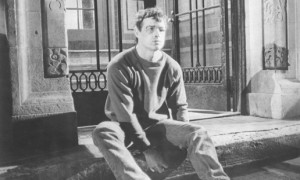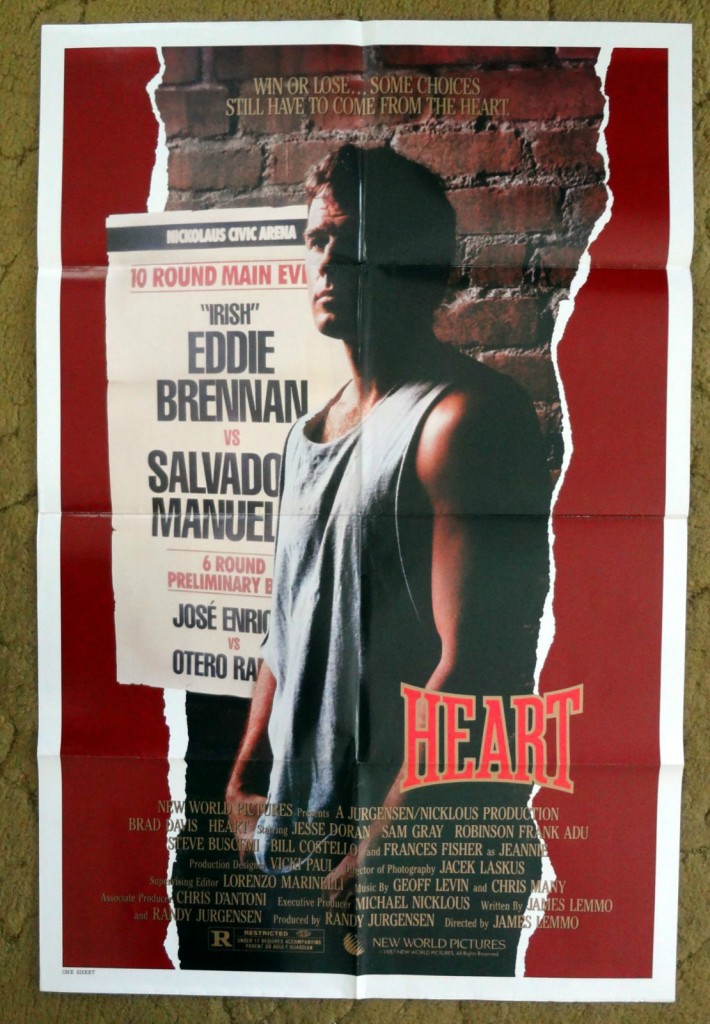 Two weeks ago friend of the Podwits, Randy Jurgensen screened a ultra-rare 35mm print of his even rarier 1987 film Heart, which starred Brad Davis, Frances Fisher and Steve Buscemi. In a nutshell the film is basically about the reality for many aspiring prizefighters hoping for the Rocky title shot happy-ending. It was screened at 92YTribeca, which was then followed by a Q&A moderated by Jonathan Hertzberg. Randy co-wrote and co-produced the film, and sadly this masterpiece has been out-of-print for years, and seeing it up on the big screen was a real treat.
Two weeks ago friend of the Podwits, Randy Jurgensen screened a ultra-rare 35mm print of his even rarier 1987 film Heart, which starred Brad Davis, Frances Fisher and Steve Buscemi. In a nutshell the film is basically about the reality for many aspiring prizefighters hoping for the Rocky title shot happy-ending. It was screened at 92YTribeca, which was then followed by a Q&A moderated by Jonathan Hertzberg. Randy co-wrote and co-produced the film, and sadly this masterpiece has been out-of-print for years, and seeing it up on the big screen was a real treat.
In attendance was the film’s producer, Chris D’Antoni and the film’s editor, Larry Marinelli; along with fellow NYPD veterans who were with Randy on that faithful day in Harlem in 1972, which became New York City’s most notorious police assassination and the basis of Randy’s book Circle of Six, which detailed the detective’s journey to bring the killer(s) to justice. I was even able to pull some strings and even got famed Medical Examiner and old friend to Randy, Doctor Michael Baden to attend, so the two could finally catch up.
It was a hugely interesting conversation about the difficulties with filming due to Brad Davis’ rapidly declining health, the grueling days of ‘Guerilla filmmaking’ that Randy was a huge part of in New York City, what it takes (and took) to make an independent film, and the complications finally trying to get the film released!
It’s a must read for any film buff, fans of the independent New York City film scene of the 1970’s-80’s, and any aspiring filmmaker looking for some advice and a push in the right direction.
Here’s what went down:
Moderator: I don’t think he needs much of an introduction for the people here, but for those who don’t know him, briefly, Randy is a (decorated) Korean War veteran, decorated NYPD veteran, and then he became a veteran of what he liked to call the “Gorilla filmmaking” years of New York City. Consulting, advising, policing, acting, and producing; and I like to tell people if you’ve only seen 2 or 3 of those classic New York Cop movies of the ‘70’s, it was almost definitely something Randy was involved in, be in front of the camera, or behind it. So without further ado, place welcome Randy Jurgensen. (Big applause)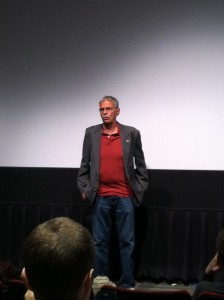
Randy Jurgensen: I’d like to thank everyone for coming here tonight. Some faces I haven’t seen in a long time… Um, this picture was put together like a host of other pictures back in the day, with independent financing, which generally fell through halfway through the picture. It was called ‘underground films’… not to be mistaken with porn, uh- (laugh) but independent filmmaking, but the title that has stuck over the years is ‘guerilla filmmaking’. And that usually meant that we weren’t connected to the studios, we didn’t have distribution, we were really out there winging it, we were non-union and it was people who would come on, and work 2, 3 jobs, to get the film done. Pictures like Vigliante, Maniac, Maniac Cop, New York Cop, and Heart– these pictures really grew on the talent, the dedication, and sometimes, not paydays for the crew that would be involved in these pictures. This picture, when we concluded this picture, I mean the last week, I stood up on a table and said to the crew, “I can’t pay you for this last week. I can’t- there’s just no money. The best I can do is give you 25 cents on the dollar. So if you’re making $100 a week, you’re only going to get $25. And I’m asking you all to stay and finish the movie.” And if there were 50 something, every one of them stayed. And at the conclusion of the picture, they gave me a sign, which I have today, which I cherish, it’s a sign that sits on my desk and says: 25 cents on the dollar. (laugh) I hope you understand what it takes to make a film like this, here. You know, a film where we could get no credit, a film where we had to pay as we go. This film was put in the can for $720k, and Chris D’Antoni and myself delivered this film to LA and they bought it on the roughcut for $780k. We made $60k and the film wasn’t even complete. That way, we were able, with that money, we were able to go into the editing room, Larry Marinelli the editor here, and finish it, sweeten it, and do whatever you have to do with the film. Pictures like this cannot be made without a group of people that I would be remiss not to draw attention to. Chris D’Antoni, Mark Lipsky, a producer and writer in his own right who helped guide me along the way, even through the hard times; Larry Marinelli, and Paul Connelly.
One of the hardest things about this picture, when we wrote it was, we could not, we truly, truly tried, for weeks, but we could not find the ending. We had dialogues, Chris D’Antoni and I would take walks and say how am I gonna end this picture? What am I gonna say? What am I gonna have Brad Davis say? And slowly but surely it dawned on us that he didn’t need to say anything. The ending is the ending without dialogue. The other thing I would like to make mention before I take questions here is, Brad Davis was very sick. We didn’t know it. He was extremely sick. He would pass on not too long after this picture. Um, he had AIDS. I could of never gotten insurance on him had I known at the start of the picture, and one of the things that began to happen to us because of the boxing sequences, especially because in the ring we had to use theatrical lights, and with theatrical lights, there’s no mercy there, and we had to raise the stage to get the lighting just right. And all of the fighters you saw were professional fighters; pros, semi-pros, some of them were amateurs that were going to turn pro, and we were always worried that one of them were going to land that blow, and that would end our picture. When we started to go to dailies, Jimmy Lemmo and myself and the rest of the crew, by the time we went to the 5th night of the dailies, we began to see that Brad Davis was losing weight- losing weight right in front of our eyes. We actually put up the first daily- a daily is what we shot on Monday, we’d look at on Tuesday, we put up what we did on Monday and put the last daily (Friday) and it was noticeable. So we had to stop the fighting, and that threw the picture right off the way the picture was planned to go. 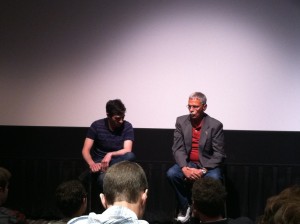 When we got started back again, we would only allow Brad Davis to box in the morning, and no longer in the afternoon. And one of the things that came about, was during this period, was we shot the end of the picture. We weren’t going to shoot the end of the picture until the end of the picture, but we shot the end of the picture maybe the second or the third week in. Frances Fisher here- I did a picture called Maniac, and it called for actually, it called for a pretty girl- a pretty-looking woman to be in the picture. She didn’t have much to say and didn’t have much to do. So somebody came to me and I can’t remember who, and I don’t take credit for this, but (said) how about Raquel Welch’s daughter? I called up Raquel Welch’s daughter, we got her down, we looked her over, we spoke so forth and so on, and I said we’ll call you. One of the investors came to me “Look, I’m going to invest blah-blah-blah, X amount of money, but this girl- and it’s not like what you’re thinking- but this girl has to be in the picture. And they girl’s name was (Catherine) Munro. So we put her in the picture and Raquel Welch’s daughter was gone. So we put her in the picture and she went on to do James Bond movies. The second picture I did was New York Cop. It was a Japanese financed picture, with Steve McQueen’s son, Chad McQueen, and it called for a pretty girl. I called up Raquel Welch’s agent, and got Raquel Welch’s daughter to come down. This time, she got as far as measurements foe clothing and whatever, and Paul Sorvino called me up and said “Look, my daughter is an actress and she can do this part” so forth and so on- so I took Paul Sorvino’s daughter, and the next picture she did was for Woody Allen, and he said (Sorvino) ”By the way, she doesn’t do topless and she doesn’t play naughty women and so forth”, and the next picture she did for Woody Allen, she played a prostitute and won the Academy Award. And Raquel Welch’s daughter was gone… (laugh) Now came this movie. Called up Raquel Welch’s daughter again, and this time Raquel Welch actually sent me a message, “I hope that this works out- this is game playing…” – whatever it was. Down she came and she read for the part, and the director James Lemmo came to me and said, “Look, I just saw picture-“ and I believe it was a TV show, “in which Frances Fisher was in, she played Lucille Ball, we got to get her. She’s Irish-looking”, so forth. Down came Frances Fisher, and goodbye Raquel Welch’s daughter (laugh). So… as a policeman, there has been a price on my head for a lot of years, but I hear that Raquel Welch has added to that price on my head. (laugh) You know I haven’t seen or spoken to her, and every now and then I look around the corner, and hopefully it isn’t Raquel Welch. And you can see that Frances Fisher went on to be, Frances Fisher. With that said, are there any questions? And look, every fighter was a professional fighter and another thing we were concerned about in that Brad Davis obviously was not fighter and alongside of these people even in the gym, you know, we didn’t want him to look awkward, we didn’t want him to embarrass himself.
When we got started back again, we would only allow Brad Davis to box in the morning, and no longer in the afternoon. And one of the things that came about, was during this period, was we shot the end of the picture. We weren’t going to shoot the end of the picture until the end of the picture, but we shot the end of the picture maybe the second or the third week in. Frances Fisher here- I did a picture called Maniac, and it called for actually, it called for a pretty girl- a pretty-looking woman to be in the picture. She didn’t have much to say and didn’t have much to do. So somebody came to me and I can’t remember who, and I don’t take credit for this, but (said) how about Raquel Welch’s daughter? I called up Raquel Welch’s daughter, we got her down, we looked her over, we spoke so forth and so on, and I said we’ll call you. One of the investors came to me “Look, I’m going to invest blah-blah-blah, X amount of money, but this girl- and it’s not like what you’re thinking- but this girl has to be in the picture. And they girl’s name was (Catherine) Munro. So we put her in the picture and Raquel Welch’s daughter was gone. So we put her in the picture and she went on to do James Bond movies. The second picture I did was New York Cop. It was a Japanese financed picture, with Steve McQueen’s son, Chad McQueen, and it called for a pretty girl. I called up Raquel Welch’s agent, and got Raquel Welch’s daughter to come down. This time, she got as far as measurements foe clothing and whatever, and Paul Sorvino called me up and said “Look, my daughter is an actress and she can do this part” so forth and so on- so I took Paul Sorvino’s daughter, and the next picture she did was for Woody Allen, and he said (Sorvino) ”By the way, she doesn’t do topless and she doesn’t play naughty women and so forth”, and the next picture she did for Woody Allen, she played a prostitute and won the Academy Award. And Raquel Welch’s daughter was gone… (laugh) Now came this movie. Called up Raquel Welch’s daughter again, and this time Raquel Welch actually sent me a message, “I hope that this works out- this is game playing…” – whatever it was. Down she came and she read for the part, and the director James Lemmo came to me and said, “Look, I just saw picture-“ and I believe it was a TV show, “in which Frances Fisher was in, she played Lucille Ball, we got to get her. She’s Irish-looking”, so forth. Down came Frances Fisher, and goodbye Raquel Welch’s daughter (laugh). So… as a policeman, there has been a price on my head for a lot of years, but I hear that Raquel Welch has added to that price on my head. (laugh) You know I haven’t seen or spoken to her, and every now and then I look around the corner, and hopefully it isn’t Raquel Welch. And you can see that Frances Fisher went on to be, Frances Fisher. With that said, are there any questions? And look, every fighter was a professional fighter and another thing we were concerned about in that Brad Davis obviously was not fighter and alongside of these people even in the gym, you know, we didn’t want him to look awkward, we didn’t want him to embarrass himself.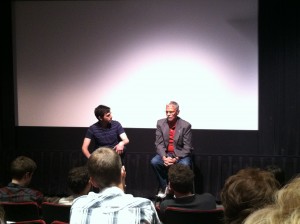
M: Well what can you tell us about the fight choreography since we’re talking about that?
RJ: The fight choreography- the fight was gonna happen at the end of the picture. Simply put, you don’t do a picture, and do a 5 week shoot or a 4 ½ week shoot where you’re going to have the prizefighter, where you’re going to have Brad Davis fight upfront and somebody breaks his nose or breaks his ribs and guess what? We’re not gonna go on with it (the picture). So, the fight was always put off until the end. Brad would be training at night; he’d be training with professional fighters. We were a week into the picture, maybe 7, 8 days into the picture, Chris will tell ya, and Brad Davis came and said, “Look, I got this on my mind, I gonna do this fight- I gotta get it out of the way.” And talk as we may, “Brad, we can’t do this now; we can’t do this at the beginning of the picture.” I had to actually had to increase and put an insurance rider on the insurance and all. He said, “I must do it.” So every day, you see Brad Davis up in the ring here, and it took us about 6 days to do, not the ones where he’s in the gym jumping, but all the fight sequences we had, it took us about 6 days to do it, that’s where we saw Brad Davis losing weight. Now once that happened, the picture went off, what we like to call the sticks. The sticks are, you’re going to have this guy in for this day, and if he’s going to get 1k a week, and he’s gonna do 4 days, we’re not gonna have him do 4 weeks, we’re gonna do his 4 days in one week. Well, we went off the sticks thanks to the fighting, so the picture certainly went 3 weeks, longer than it was supposed to- not that bad, but we definitely went over budget, causing me to give you what I told you, telling the crew I couldn’t pay them the last week. By the way, everybody got paid.
M: Let us step back and talk briefly about the development of the film. How did you get in connected with Jim Lemmo?
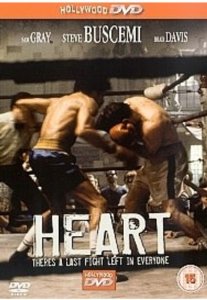
Heart
RJ: Oh, Jimmy Lemmo and I, we started back in the days of stealing shots on Vigilante, like for example, you see Brad Davis up on the subway here, we couldn’t get a permit for that, so we just went and did it. There were certain other scenes in here with Brad Davis, uh, you know, that’s why you’ll notice that it’s pretty devoid of any kind of people or anything in there because we were up there stealing the shots. You know if the Mayor’s office found out- but Jimmy Lemmo and I worked on Vigilante, we worked on Maniac, we worked on Maniac Cop, and we saw a boxing movie, I don’t remember which one it was, and we were always tinkering with the idea of writing our own, which is what we wanted to do. In fact we wrote one called Duece, which will soon be a book, which is about 42nd Street. So we decided to write this. And we decided to write it, that it would be definitely a love story, with boxing in the background. But you can’t help but see that boxing takes over the picture, rather than the love story. So we actually wrote it as a love story. I knew about this world, it does exist, there are club fighters who fought for $100 a fight; they absolutely did. They fought at St. Jude’s Arena and places like that. And I for two years boxed in the Golden Gloves, so I knew a little something about it. And some good, very long-lasting friends (came out of that) like Short, Jimmy Short, he was the referee. He was a contender for the middleweight championship of the world. So I knew that world inside and out. And I also knew the crookediness of the world, and Lemmo and I deliberately, deliberately set out to make the bad guys as white as possible. We didn’t want any of the bad guys to be what you always see, gangsters, possibly of an Italian extraction, so we went to what Jimmy and I would talk about, let’s get a Mid-European look. Therefore we got Sam Grey, a damn-good character actor; Steve Buscemi, I mean the guy is whiter than a container of white milk. We stayed away for what you would see, what you would call, the ‘normal’ bad guys, that you’d see all the time. We weren’t going to have any of the bad guy’s names end in a vowel. (laugh)
M: And tell us how you came about casting Brad Davis?
RJ: Oh yes. I was very, very good friends with Treat Williams. So I wrote this picture longhand; no dialogue, I wrote it on a yellow pad, how I thought the story should go. And I always kept Treat Williams in mind. And I told Treat Williams I was writing this and it was about Treat Williams, who could play a heavy weight.
M: He played Jack Dempsey earlier?
RJ: Yes he did. And so I was home free with Treat Williams. Treat Williams’ girlfriend who ended up in China Beach, and had her own show-
M: Dana Delany?
RJ: Dana Delany! He wanted Dana Delany to play the part, and I agreed to that right away. And then we had secured some money, to get going into preproduction, cause usually there is no money to be spent on preproduction in a picture like this, and Treat Williams got a part, in a big picture. And I was stuck. The clock was ticking. And I forget who the casting people came up with, but they came up with Brad Davis. And obviously Brad Davis was not a heavyweight. So there was a lot of dialogue, there was a lot of scenes that needed to be changed. Fighters that we had onboard, we now had to get fighters who were going to look more like Brad Davis. And when he came on, he was very, very honest and he said “I don’t know anything about boxing.” And I’ve learned that that’s a good thing. That’s really a good thing; when you get an actor that doesn’t know anything about riding a motorcycle, when he has to ride a motorcycle. He doesn’t bring any preconceived ideas or parts to it. He learns, and once he learns and actors are sponges, they absorb everything- Gene Hackman was unbelievable in The French Connection– so Brad Davis not knowing anything about boxing was very easy not to break habits that he knew, but to teach, and he was taught by some of the best. I think he did a pretty good job.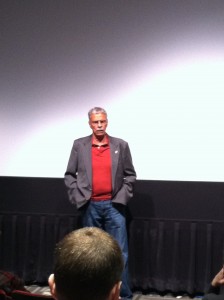
M: Before we open it up to the audience, I can’t not bring up Cruising, (laughs and acknowledgment) and I just wanted to know, when you had worked with Brad Davis’ brother Gene Davis on Cruising–
RJ: I did.
M: – And did that have anything to do with him coming onto this film, or did that ever come up in conversation?
RJ: Uh… Yes, it did come up in conversation; obviously it did. And he was extremely proud of what his brother had done. He knew the deal; Brad was very, very sick in the end there, and that did come up in about Cruising, cause all I remember about Cruising, once again when it came to the female part was… uh… No Raquel Welch… (big laugh)
M: Ok, let’s open it-
RJ: Oh! And one of the other people I would like to call attention to and introduce to you, is a very good friend of mine, and we met under circumstances that go back a long, long way. When I was a homicide detective and I was working on the assassination of the police officers, the Medical Examiner, a complete and total professional Medical Examiner, that testified- and even wound up testifying in the OJ Simpson case, Doctor Michael Baden, a friend of many, many years. (big applause)
Michael Baden: Ha, ha. Thank you, thank you. I have a question in fact-
RJ: In fact Dr. Baden of course is the one who gave me permission to give to Billy Friedkin to shoot in the New York City Morgue, and no film has ever been in the Morgue before, and no film (chuckles) has ever been in the Morgue since. (audience laugh) That was a tough one. Ha, ha. That was a tough one.
MB: Talking about the morgue, I have a question.
RJ: Yes?
MB: I thought that the cock fighting scene was terrific… how did you arrange it?
RJ: Ah!
MB: You were a cop? (laugh)
RJ: I was a cop…
MB: Ha ha-ha-ha.
RJ: Ha. I was a cop and therefore, I was going to be there that night. (big laugh)
MB: HA!
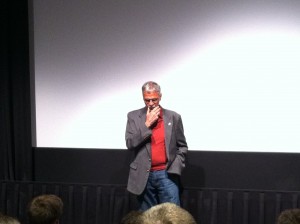 RJ: My wife can tell this story better me. I wasn’t going to be there because it was illegal, and we had no permit, and we found the people that actually do it, and we were going to do it at night- like 12 o’clock at night. And so, they got the cocks. So forgive me, this phone call happened… this phone call actually happened from Jimmy Lemmo. It was 12 in the morning, 12-1 o’clock and Jimmy Lemmo says “we got a problem.” I said “What?” He said, “ the cocks go to sleep at 12 o’clock…” (laugh) “… and they don’t wake up til about 5 or 6 in the morning. I got all these people here, what do we do?” I said “Jimmy,” I said, “Jimmy, don’t give me another phone call like this, just work it out and see what you can do.” 2 o’clock in the morning, phone rings, my wife answers the phone and she said, “Jimmy Lemmo said the cocks won’t wake up…” (Big long audience laugh) And I said, “Look Jim, you guys got to figure this out, talk to them, but you CAN’T stay there! Sooner or later, somebody’s gonna get arrested.” So what they ended up doing, and I promise you none of them were hurt, the people that ran it, they would have some alcohol, they would blow the alcohol in front of the cocks, and as soon as they would wake up like that, they would throw them in front of the camera. That’s why, if you notice, there are a lot of shots of the cocks coming into toward the camera, there’s very little fighting there. That cock you saw dead, was dead, (laugh) we didn’t kill that! He was dead when we filmed that. We tried to get some symbolism into the movie here, by showing that cock losing the fight, going into the cage, and that cock was going to be Eddie. I think that point was lost. So at 5 o’clock in the morning, again I turned to my wife and the phone rings, and it’s Jimmy Lemmo, and I said “JIMMY!” and he said ”Listen Randy…” and it was 5 o’clock in the morning and the cocks were going “COCKADUETULADO!!!!!” (big laugh) They were waking up! They had all the film and we got out of there. (laugh) So yes, it was illegal, yes, we stole the shots… absolutely.
RJ: My wife can tell this story better me. I wasn’t going to be there because it was illegal, and we had no permit, and we found the people that actually do it, and we were going to do it at night- like 12 o’clock at night. And so, they got the cocks. So forgive me, this phone call happened… this phone call actually happened from Jimmy Lemmo. It was 12 in the morning, 12-1 o’clock and Jimmy Lemmo says “we got a problem.” I said “What?” He said, “ the cocks go to sleep at 12 o’clock…” (laugh) “… and they don’t wake up til about 5 or 6 in the morning. I got all these people here, what do we do?” I said “Jimmy,” I said, “Jimmy, don’t give me another phone call like this, just work it out and see what you can do.” 2 o’clock in the morning, phone rings, my wife answers the phone and she said, “Jimmy Lemmo said the cocks won’t wake up…” (Big long audience laugh) And I said, “Look Jim, you guys got to figure this out, talk to them, but you CAN’T stay there! Sooner or later, somebody’s gonna get arrested.” So what they ended up doing, and I promise you none of them were hurt, the people that ran it, they would have some alcohol, they would blow the alcohol in front of the cocks, and as soon as they would wake up like that, they would throw them in front of the camera. That’s why, if you notice, there are a lot of shots of the cocks coming into toward the camera, there’s very little fighting there. That cock you saw dead, was dead, (laugh) we didn’t kill that! He was dead when we filmed that. We tried to get some symbolism into the movie here, by showing that cock losing the fight, going into the cage, and that cock was going to be Eddie. I think that point was lost. So at 5 o’clock in the morning, again I turned to my wife and the phone rings, and it’s Jimmy Lemmo, and I said “JIMMY!” and he said ”Listen Randy…” and it was 5 o’clock in the morning and the cocks were going “COCKADUETULADO!!!!!” (big laugh) They were waking up! They had all the film and we got out of there. (laugh) So yes, it was illegal, yes, we stole the shots… absolutely.
Chris D’Antoni: Randy I was trying to remember… the scenes where Brad is training, and he’s running through the neighborhoods, they looked pretty bombed-out. I can’t remember for the life of me- what neighborhoods was that? I can’t remember. Was that Queens or in Brooklyn-?
RJ: South Bronx. We did that in the South Bronx. You see under the rails was 125th Street- that’s my playground, that’s where I was born and raised. Yes?
Q: Ya you mentioned about the stolen shots and you said you could never get a permit to do the subway business-
RJ: Naw.
Q: -yet at the end, you acknowledge the Mayor’s Office for Film and broadcasting for their fantastic assistance- what assistance do they really give, or are you obliged to do that?
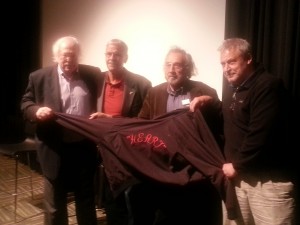
Doctor Michael Baden & creators of Heart: Randy Jurgensen, Larry Marinelli & Chris D’Antoni
RJ: Yes. Uh, we have to get permits. And uh… the problem with doing a picture like this is if you get to a location that a television show has been in, or a big studio, these locations, the rentals- they don’t want to give us the rentals. They absolutely do not want to give us the rental because we cannot pay what NBC or CBS or a television show will pay. So what we do, even though we have the permit from the Mayor’s Office… I mean statute of limitations has run out- I make an under the table deal with people and always carry a shopping bag, Chris will tell you I had a shopping bag with $50’s in it. You know and I would get to this location and I would say to the guy, “I know what NBC would paid you and I can’t pay you that, BUT, I do have a permit…” but I could never notify the Mayor’s Office. We did a lot of that; I wasn’t the only one that did that, but we did a lot of that in a lot of the pictures. But yes, you thank the Mayor’s Office because if you don’t, next time you go to the Mayor’s Office, they’re not going to give me a permit. And a lot of times the Mayor’s Office figure out what you’re going to do, but just don’t want to know about it, you know? So I learned don’t ask a question you can’t take the answer to. So, I thanked everybody there; (laugh) all the people. All the equipment Everlast gave us if we promised we’d put it on the film. The sad part about this film is, and I’m not bitter about it- but the sad part about this film is we got the reviews and we had reviews that were unbelievable. (to D’Antoni) Which you can attest to. I made the deal first, with Jerry Weintraub; big, big, big- Jerry Weintraub, big producer. And he said to me, “Randy I’ll take the picture, but I gotta hold it a year. I’m coming out with a picture called Deep Blue”, or was it Big Blue? But the clock was ticking and we had investors and the interest was going along in the bank, I couldn’t wait a year. I knew I owed hardware bills, the catering people fed the crew and we owed them, so… I had to make a deal. So I was told New World was venturing into film, New World was in television, so New World said they would take a look at the picture. So Chris D’Antoni and I go on an airplane with the roughcut, right Larry? It was the roughcut? It wasn’t finished and still uncut and only pasted together…
Larry Marinelli: Ya It was the roughcut.
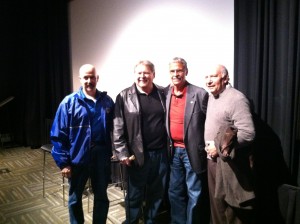
The brave NYPD Officers on site at Mosque #7 in 1972
RJ: And We went out, Chris and I, and we delivered it to New World, and we pretended we were the messengers, cause we didn’t have money to give messengers to deliver the film. So we delivered the film, they looked at it and they called us the next day and said they were ready to make a deal. But they were ready to make a deal on a finished product. So there was so bartering back and forth, I did the bartering, back and forth, and I roughly needed about $110k to finish the picture; that was to pay the crew, to pay everybody, pay some of the interest, but I didn’t have the editing money. Larry was running on empty. And I needed that… and I needed music… I needed everything it takes to sweeten a picture. So I said I would take one third of the money, only one third- and you’d think I was down on Canal Street bartering back and forth, and they agreed to give me one third of the money. I got it, came back to New York and finished the picture. The editing, the cutting, the color-coding, all what it takes, the timing, we got it all. And upon delivery, I got the 2nd payment, and that really took care of the banks and held off the investors, and the other just in cases’. And the 3rd payment was gonna come when the film was released, and we talked about 700 prints. We could afford 700 prints. We presently had 26. 26 prints of this film… and New World went belly-up- outta business. (gasps) And the best I could do- I got the money because- they had to pay me the money because it was in escrow; so the best I could do, was take the 26 prints and start across the country, and it took me about 2 months. And we played in 13 theaters in Texas, California, we moved our way into Indiana, I don’t know if you came with me Chris and we opened there- and I begged, I begged could we open in New York… Please get me a place to open in New York. And uh, they wouldn’t do it. New World won’t go for the money. And I then would not spend the investor’s money and take that risk. So we didn’t open in New York until about 3 months after the picture was complete. We opened in New York to good reviews, good audiences, but there’s a flaw- there’s a flaw. When you go into a movie theater, the movie theater has to be guaranteed X amount of dollars every week. And if you don’t meet that X amount of dollars, you have to pay to keep your film in there. So, the first 2 weeks of the theater, I met the floor. The third week, I did not and the picture was pulled out. So there were just 26 copies of this picture, 26 prints of this film. This print was mine; I kept this print.
M: You kept it in a very secure place…
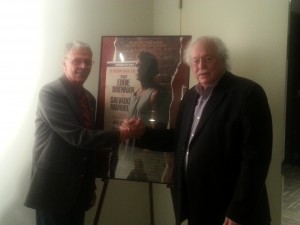
Randy Jurgensen & Doctor Michael Baden
RJ: (Randy smiles) I kept it in the garage. (laugh) I kept that in the garage. My wife used to say to me, “it’s in the way, it’s in the way of the closets.” And I’d just say, let me just keep it. This man came to me and said “you did Heart and everything else and so forth, I think we could get it shown at Tribeca”, and I said “Ok, I got a copy of it.” And she said, “You do?” And I said, “Ya, I got a print of it, no guarantee.” And when I went to look at it, I talked to Larry, and when I went to get it, the cans had rusted. I said Hmm- And I came down and I brought it down here and gave him the film and I think it was 10 days, and it was the longest 10 days and I got an email and it said “You know the print is a little light, but we’re gonna go ahead and show it.” I haven’t seen this on the screen since… 1980…8 I’d say. Although I do have cassettes that have been transferred into DVD… yes.
M: Tell us that story about the Boston Film Festival.
RJ: Oh ya! So I was able to come up with the entrance fee and I went into the Boston Film Festival. Anything I’ve developed in this business, any knowledge that I have in this business, comes from Chris D’Antoni’s Dad, Phil D’Antoni, by mentor for life, and Billy Friedkin. My mentor, my friend for life, but a pretty hard tasks master. So when I went into the Boston Film Festival, they have what they call the Centerpiece Award, and I was up against 2 other films that I can’t remember, but I was also up against Billy Friedkin’s film called Rampage. And I beat Billy Friedkin out… (Laugh) and I got the Centerpiece Award. And I don’t want to say he didn’t talk to me, but all he kept saying to me was- and I’m sorry to the ladies here- “Don’t fucking forget to tell people I taught you everything you know!” I said “Ok Billy! You got it!” Yes?
Q: What would you say to any aspiring filmmakers out there?
RJ: I’d say to any young filmmakers that aspire in any way that they think they’re going to go out and make a film, and they think that they can do this- I’m telling you to go for it. Go and do it. Go and get a small camera and go out and do it. I have a daughter here, who went to film school and filmed a small, little film… it. can. be. done. You don’t have to reach, and have to go and do a million dollar, or 3 million dollar movie; you don’t have to do it. You just have to have, believe me, you really just have to have, the heart. Go out and try it, go out and do it. If there are no other questions, I don’t want to keep you, it’s getting late… Once again I want to thank all for coming. (Applause) And I’m not selling my friends book, but if you really want to read a good book, it’s called The Friedkin Connection, and it’s about Billy Friedkin and how he started out in the business and how he got to where he is today. Thank you all again and thank you all for coming. (Big applause)
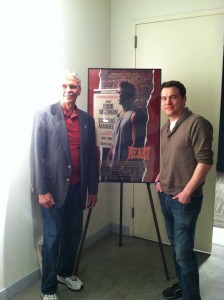
Randy Jurgensen & Dion Baia
